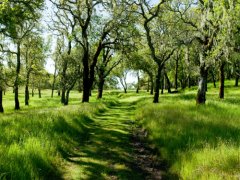Significant Environmental Issues
 ACR has a 53 year history of leadership in regional conservation and a commitment to “Conservation in Action.” This includes our efforts to address the major impacts that are expected from Climate Change over the coming decades; e.g. higher than average temperatures, an increase in the severity of storms and drought, sea level rise, and a changing ecological landscape. With our increasing attention to these impacts and our leadership role in building community awareness of regional conservation concerns, ACR is well positioned to make key contributions that can promote broad cultural change needed to reduce carbon emissions. As the most significant environmental issue of our time that will impact both natural and human communities, we all need to pull together to find solutions that will sustain future generations and the rich diversity of life on Earth.
ACR has a 53 year history of leadership in regional conservation and a commitment to “Conservation in Action.” This includes our efforts to address the major impacts that are expected from Climate Change over the coming decades; e.g. higher than average temperatures, an increase in the severity of storms and drought, sea level rise, and a changing ecological landscape. With our increasing attention to these impacts and our leadership role in building community awareness of regional conservation concerns, ACR is well positioned to make key contributions that can promote broad cultural change needed to reduce carbon emissions. As the most significant environmental issue of our time that will impact both natural and human communities, we all need to pull together to find solutions that will sustain future generations and the rich diversity of life on Earth.
ACR’s Climate Change goals:
- Increase ecosystem diversity and climate resilience
- Educate community members of all ages
- Model responsible, climate-smart land-use practices
- Instill an appreciation of the natural world, including its sensitivity to climate change and its dependence on conservation action
- Promote an awareness of climate impacts on local ecosystems and human environments
- Study the effects of Climate Change on our local ecosystems and make science-based recommendations for appropriate conservation action
 Following its mission, ACR meets these goals by:
Following its mission, ACR meets these goals by:
Protecting valuable habitats
ACR owns and manages over 5, 000 acres of diverse habitats in Marin and Sonoma Counties. These protected lands are critical watersheds that hold and filter the water that serve our biotic and human communities. They act as large-scale refuges for native plants and animals from numerous man-made disturbances in our region. Of particular importance is the emerging value of ACR lands as areas for refuge and dispersal of plants and animals responding to climate-induced changes in environmental conditions.
Studying the effects of Climate Change
ACR has 25+ years of data on waterbird and shorebird abundance and diversity, including heron and egret reproductive performance, and the responses of birds to broad changes in habitat conditions, weather, and climate. These long term data sets are invaluable in helping to understand population dynamics and changes over time that can direct resource management decisions.
Demonstrating stewardship both on and off our properties
ACR can most easily increase ecosystem diversity and climate resilience by protecting and restoring its own properties. We attack invasive plants and animals and implement restoration projects using both our trained staff and our cadre of stewardship volunteers. By re-establishing and protecting the natural nutrient and energy pathways, and supporting the natural integrity of surrounding landscapes, ecosystems on and off ACR lands will be more resilient to environmental change.
Educating the community, so that everyone can be a part of the solution
Teaching a wide range of community members through our extensive education programs, ACR is working with a diversity of ages, cultures, and those with physical or economic challenges. Our extensive network of over 800 volunteers across our programs are committed to being a part of the solution and acting as ambassadors of responsible conservation. By educating over 3, 000 3rd-5th graders annually, as well as our cadre of highly trained docents and others, we initiate an expanding ripple effect of responsible conservation dialog, deeper understanding of the natural processes behind climate change, and broader appreciation of conservation action needed to protect the natural world.
Demonstrating responsible land use
ACR models actions that will help to reduce the causes and effects of Climate Change. These include water conservation strategies at all of our preserves, the installation of rainwater catchment systems on appropriate buildings, the use of electric vehicles for staff travel, and the conversion to solar power. We will continue to implement new strategies as research and technology dictates.









